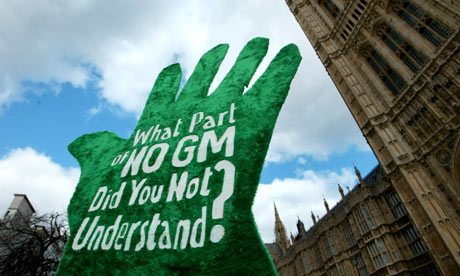
Europe paves way for GM crop bans
European commission vote on Tuesday opens door to countries individually banning GM crops
- guardian.co.uk,
Anti-GM campaigners outside parliament. Photograph: Martin Argles for the ObserverThe European Parliament on Tuesday backed plans to let member states choose whether to ban the cultivation of genetically-modified (GM) crops on their territory, giving a detailed list of grounds on which such bans could be imposed.The House voted to amend European Commission proposals for an EU regulation that would allow member states to restrict or ban the cultivation on their territory of GM crops, which have been given safety approval at EU level.The Commission's initial proposal suggested that member states could restrict or ban their cultivation on all but health or environmental grounds, which were to be assessed solely by the European Food Safety Authority (EFSA).But the proposals have sparked a wave of criticism, with businesses fearing they could lead to fragmentation of the internal market, bringing legal uncertainty for farmers. Some of the EU executive's proposals have also been deemed incompatible with World Trade Organisation (WTO) rules.The Parliament's report seeks to provide member states with "a solid legal basis" for banning GM crop cultivation, and to give them better legal protection in the event of challenges from trading partners opposed to bans.The report - adopted with 548 votes in favour, 84 against and 31 abstentions – lists a number of reasons to allow member states to impose bans. These include:• Environmental grounds: Such as pesticide resistance, the invasiveness of certain crops, threats to biodiversity or a lack of data on potential negative consequences for the environment. • Socio-economic considerations: Such as the practicality and cost of measures to avoid an unintentional presence of GMOs in other products, fragmentation of territory, changes in agricultural practices linked to intellectual property regimes, or social policy objectives such as the conservation of diversity or distinctive agricultural practices. • Grounds relating to land use and agricultural practices.Health Commissioner John Dalli noted that specifying the grounds on which the cultivation could be restricted would indeed enhance the EU executive proposal. "I can therefore support this approach," he said.Dalli also welcomed the Parliament's restriction criteria for being largely inspired by the indicative list that the Commission had already developed.But he insisted that the environmental considerations put forward for banning GMOs should be clearly distinct from those that have already been assessed by the European Food Safety Authority (EFSA).In addition, he stressed that "any grounds need to be substantiated and in line with the reality of the territory in question".In another move, the Parliament voted to change the legal basis of the Commission proposal from Article 114 (on the approximation of national law to establish the internal market) of the EU Treaty to Article 192, which is related to the environment.The Parliament's rapporteur, French MEP Corinne Lepage (Alliance of Liberals and Democrats for Europe), said that basing the proposal on Article 192 would give member states more say on the matter.But Commissioner Dalli said he still thought that the Article 114 was best suited to the proposal.The Parliament's report maintains a common EU authorisation framework for GMOs, but the House wants the risk assessment conducted at EU level by EFSA to be improved by taking into account long-term environmental effects or effects on non-target organisms before a new GMO variety can be authorised.The Parliament also insisted that member states must take measures to prevent contamination of conventional or organic farming by GM crops, and ensure that those responsible for such incidents can be held financially liable.Source: http://www.guardian.co.uk/environment/2011/jul/06/europe-gm-crop-bans
No comments:
Post a Comment